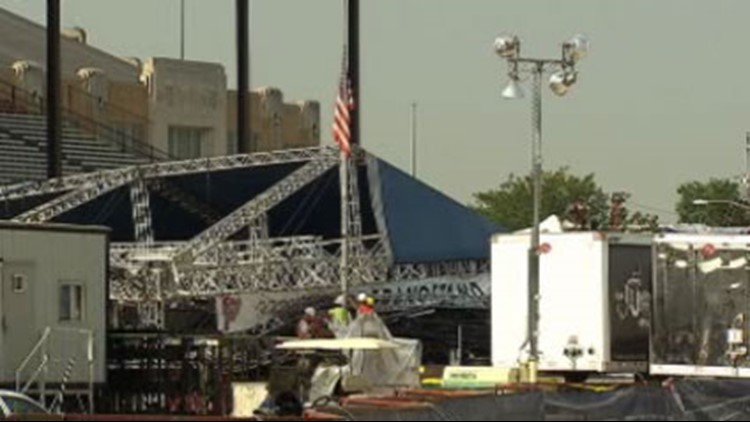Fans of big outdoor concerts and other events ought to be safer this summer. Indiana implemented new emergency building safety standards Wednesday designed to avoid another tragedy like we saw at the State Fair in August 2011.
These are Indiana's first rules governing the type of stage rigging involved in last summer's deadly state fair stage collapse.
Members of the Indiana Fire Prevention and Building Safety Commission voted unanimously Wednesday morning in favor of the regulations that board chairman David Hannum says will take effect Thursday.
Organizers must now submit detailed plans, design specifications, and certifications ensuring the supports can withstand extreme weight and weather, along with emergency plans. State inspections are mandatory. Smaller fairs and festivals would be exempt from most of the regulations if they create a buffer zone around their stages that extends eight feet beyond the height of the rigging to protect fans in case of a collapse.
The rules are primarily concerned with equipment not attached to a stage. That equipment is now defined as a Class 1 structure, and it will be regulated and inspected for the first time in Indiana. This could mean permanent towers, booms, ramps, platforms, overhead assemblies or rigging used in connection with an outdoor performance.
"If there is something over the head of the public, it will be certified as safe. It is not going to fall under any normal set of circumstances," said David Hannum, chairman of Indiana's Fire Prevention and Building Safety Commission.
The Indiana Dept. of Homeland Security or state fire marshal personnel will inspect the stage equipment, and any venue planning an event which uses it will have to notify the state fire marshal within two weeks of the event.
The new rules also mean that every festival and fair must have an amusement entertainment permit from the fire marshal's office before it can open.
A state law passed during this year's legislative session directed the commission to adopt temporary rules in the wake of the August 13 stage rigging collapse that killed seven people before a scheduled Sugarland concert at the state fairgrounds.
None of the regulations were required when the rigging collapsed at the fairgrounds. State regulators can't say whether the new rules would have prevented the State Fair tragedy, but do believe the temporary steel structure would have been much stronger.
"The design of the system in place was not up to the codes we are referring to now as minimum standards," Hannum said.
The new safety mandates extend beyond building codes. If the state fair had an adequate safety plan, thousands of fans could have been evacuated and stagehands, up in the rigging and down on the stage, could have been told to leave, many believe, avoiding the tragedy.
For the first time, event organizers must have comprehensive emergency response plans. But the regulations stop short of saying who makes the decision to implement them. Representative Ed Delaney co-sponsored legislation authorizing the changes, but he wants more.
"A person designated, on the scene, who is weather-wise and who has the ability to say 'We are out of here'," said Delaney (D-Indianapolis). "That's one of the core problems. I don't see where it gets us to that point."
More changes are likely coming. This summer, the legislative study committee will consider more comprehensive safety regulations. Those put in place Wednesday are emergency rules set to expire in 2014.
State Fire Marshall Jim Greeson started enforcing the rules months ago as emergency guidelines. So far, he says, there have been few problems.
Background
State Sen. Tim Lanane (D-Anderson) wrote the legislation prompting new regulations, which he and others are concerned may be so demanding, small events may not be able to afford or implement them and be forced to cancel. Lanane hopes Indiana's Fire & Building Safety Commission scales the new requirements according the size of the event.
"You don't need the exact same standards for the stages and other structures at the State Fairgrounds as you do at county fairs and your local town festival," he said.
Companies building tents, stages and other temporary structures say they are already following tougher state safety guidelines.
"It's all boils down to the safety for our guests and people who do the special events with us," said Mike Wiggins of A Classic Party Rental, who rents and erects a variety of stages and tents.
The guidelines, Wiggins says, vary with their size and can require additional exits, fire extinguishers, a $250 permit and inspections.
"We schedule an on-site inspection after the tent is installed and they go through and make sure we are following the guidelines. It's been a pretty simple process," Wiggins said.



